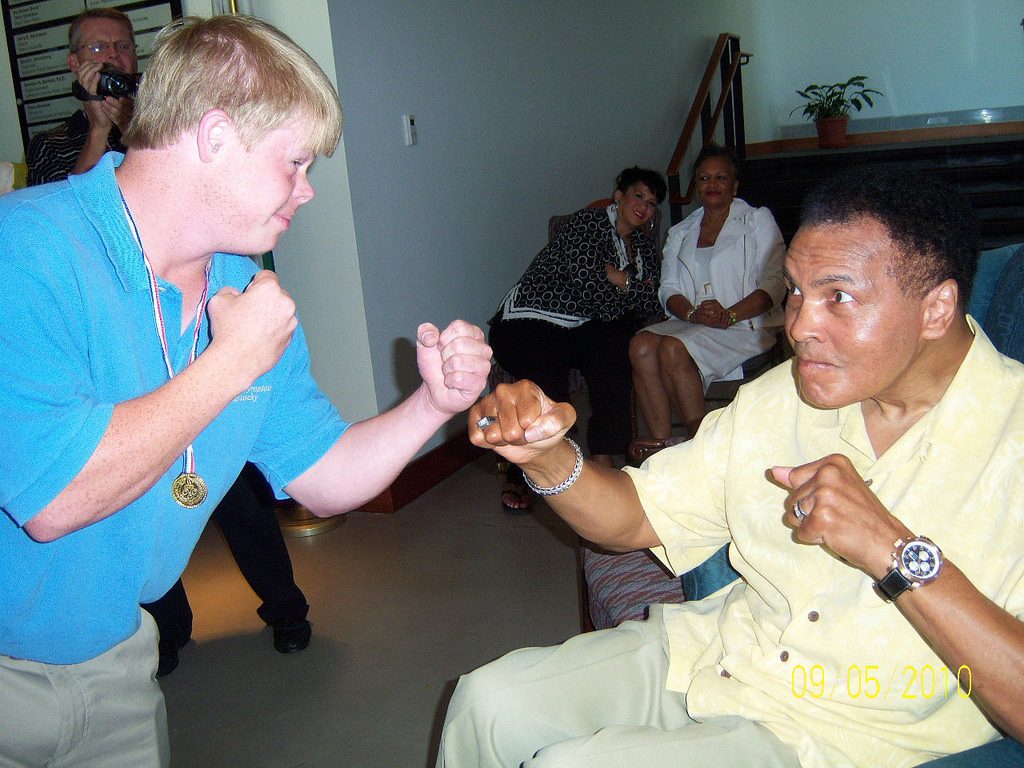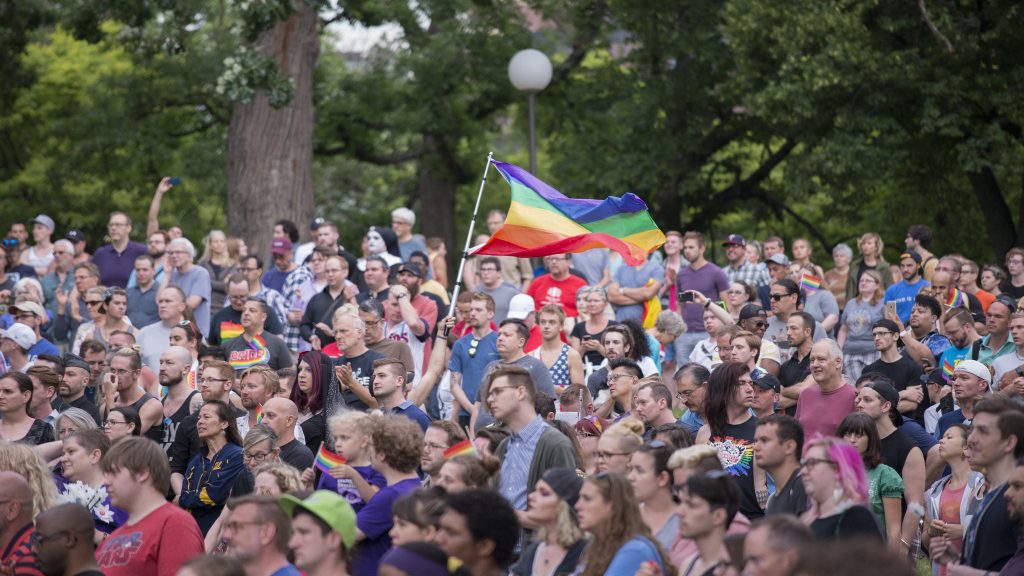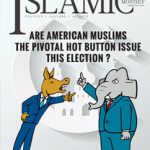The passing of Muhammad Ali brought the briefest of repose for American Muslims. For a moment, the world stood still to pay homage to Ali and his adopted faith. It was an opportunity for Muslims to bask in a moment of revelry. The great enthusiasm for Ali cast a spell of media attention on Islam — and for once, the news was all good. The media actively portrayed Ali’s conversion to Islam and the philanthropic aspects of his charity-driven life.
This rare moment of celebration also served as a reminder of Islam’s cultural roots in America. It was a reminder that Ali was an associate of the late Malcolm X. Together, these two icons stand among the most popular Muslims the world has ever seen. Both were black and both were American, and their history authenticates Islam’s place in American culture. Ali’s passing is an opportunity to ponder Islam as something far more familiar than foreign. As such, for Muslims, Ali’s death was a fortuitous PR campaign that was a perfect counternarrative to Trump-ed up anti-Muslim sentiment — it was an absolute example of a Muslim who helped better the world.

Muhammad Ali’s funeral procession >Flickr/Louisville Images
Hardly a week after Ali’s body was laid to rest in his home state of Kentucky, terror struck in Orlando, Florida. The joyful mourning over Ali was cut short by news of an attack on a gay nightclub that left 49 people dead. It was a textbook lone-wolf style attack, with the shooter himself perishing from police gunfire.
The shooting in Orlando broke from more recent jihadist activity in America in two important ways. On the one hand, the scale of this attack proved more deadly than any other violent campaign in the post-9/11 era. On the other, the targeting of gays represents a veer from traditional targeting. Jihadist plotting against government and civilian targets is typical, but the focus on gays specifically adds a new wrinkle for American politics.
In these two flash events, newspaper headlines ran the very best and worst of American Islam. It was an extreme lesson in extremism: Ali’s decadeslong saga as a radical peacemaker, eclipsed by a shooting spree that wreaked untold tragedy in a matter of minutes.
In each event, there is something that sits very close to home. The mourning over boxing’s greatest messiah is a reminder that Islam has an indigenous foundation in the United States that dates to the early part of the 20th century. Indeed, Ali is chronicled as having attended his first Nation of Islam meeting in 1961. His affiliation with Islam predated the arrival of large numbers of Arabs, Africans and South Asians who now make up a majority of Muslims in America. These groups immigrated to the U.S. after the Immigration and Naturalization Act of 1965 was passed into law. Hence, well before the mass arrival of Muslims from abroad, groups like the Moorish Science Temple and the Nation of Islam were well established with vigorous outreach efforts.
Likewise, the Orlando shooting demonstrated a hatred that Americans know too well. The episode comes on the heels of a great legislative tide manufactured by Christian interests, which have mobilized to claw back at the legalization of same-sex marriage, and have lobbied for laws that allow discrimination based on religious beliefs. Hence, the shooting, although coming from previously unknown quarters, sits within a broader tapestry of American homophobia. The culture is such that it would be hardly surprising to learn that the staunchest gay-haters nodded in approval when they heard about the Orlando shooting; for the most diehard, the shooter will be viewed with admiration.
The anti-gay attitudes converge because of their common theological ancestry. Both Christians and Muslims invest authority in the ancient Hebrew Bible, which contains codes and stories believed to condemn homosexuality. Hence, what drives the shooter’s beliefs is the same as what drives the push for anti-LGBT legislation. The Orlando shooting brings this likeness to the fore.
What follows posits that these events likely signal a leveling off or plateauing of Islamophobia in America. These episodes, both joyful and tragic, have a distinct familiarity that renders Muslims, even the extremists, less foreign and frightening. Together, the passing of Muhammad Ali and the Orlando massacre have the potential to demystify Islam in the American mind and lead to a cooling of American aggression against Muslims. Understanding these events in a cultural context will be especially valuable for voters in the 2016 presidential election.

Muhammad Ali with German Muslims. >Flickr/Rabwah
Muhammad Ali: American icon & radical pacifist
Muhammad Ali is himself a slice of Americana. His superstardom was the product of both his boxing skills and activism outside the ring. His showmanship, theatrics and street poetry made him arguably the most famous athlete of all time. Ali carved out a distinguished boxing career and emerged as a civil rights icon who earned honorary doctoral degrees and was given titles like “Sportsman of the Century” and “Sports Personality of the Century.”
Ali’s bread and butter as an athlete was his raw boxing talent. His illustrious professional boxing career includes classic thrillers like the Rumble in the Jungle and the Thrilla in Manila, and becoming a three-time heavyweight champion of the world. This pro career was founded on an equally decorated amateur background that included wins in state and national Golden Gloves competitions and an Olympic gold medal.
Outside the squared-circle, Ali led a life of activism, grounded in a pro-peace, anti-war worldview. Ali’s fame and legend grew in part because of his refusal to serve in the Army during the Vietnam War. Ali was convicted of draft evasion and was stripped of his boxing titles. After nearly four years of appealing his case, Clay v. United States (1971), Ali, formerly known as Cassius Clay, won when the U.S. Supreme Court unanimously upheld his conscientious objector claim and dismissed the charges against him.
During the years of the appeal, however, Ali was banned from professional boxing and no sanctioning body would allow him to fight. Although he managed to win in the highest court in the country, the fight cost him some prime years inside the ring. Still, his refusal to fight would help build the legend of Ali — who even beat the U.S. government. He forfeited precious years waging a struggle in the belief that Islam is a religion of peace and that the Quran forbade his participation in the war.
Ali’s early activism set the stage for what would become a lifelong mission in humanitarianism. In life, he helped raise millions of dollars for charitable causes, was nominated for a Nobel Peace Prize and was officially named a United Nations Messenger of Peace. In death, he is a poster child for Islam and the contributions that Muslims make to the world.

A Special Olympics athlete of the year meets the Olympic gold medalist. >Flickr/Monkey Mancheeks
The ultimate gay bashing in America
The attack in Orlando quickly turned attention from Ali’s reminiscence to something far more ominous. The media reported a night of terror at the hands of one who pledged allegiance to ISIS. The sheer magnitude of the attack made it headline material as the single most deadly mass shooting in the country’s modern era.
The specific targeting of a gay bar made the event a watershed moment for LGBT politics. As it stood, LGBT advocates had already been entrenched in a cultural war over same-sex marriage. The Orlando shooting upped the ante and has become the crown jewel of anti-gay violence in America.

A vigil in memory of the Orlando victims. >Flickr/Alisdare Hickson
The attack must be understood within the context of American homophobia. For example, there have been anti-sodomy laws and other laws targeting gays on the books since the earliest movements of the colonies, and more recently, gay pride parades have been attacked, while gay beatings and killings continue like clockwork in America.
The American culture of homophobia has impelled many states to include LGBT provisions in their hate-crime laws. Now, many statutes specifically include language like “sexual orientation,” “gender” and “gender identity” as categories for protection. Despite this favorable development, there are still great challenges on the ground, as one FBI report noted for 2014: Out of all hate crime motivators, sexual orientation is the second-most common reason for hate crimes.
As positive as these developments were, the ultimate legal victory for LGBT communities came in the Supreme Court opinion, Obergefell v. Hodges (2015), which legalized same-sex marriage. This national victory was a huge push for gay rights in the country, but it would come at the cost of intense social outrage.
The political backlash that followed the Obergefell decision is a stark lesson in American homophobia. The ink from the court’s opinion had barely dried before opponents of same-sex marriage launched an all-out assault of anti-gay bills. Popularly dubbed as “religious freedom” laws or “bathroom bills,” a new wave of legislation permitted businesses and individuals to discriminate against people whose lifestyle discorded with their own religious beliefs. In the year since Obergefell, state legislatures have produced hundreds of such bills that scale back gay rights in the name of religion.
The Orlando shooting took place amidst this religious revolt against gays. CNN described the political fervor as an “onslaught” of legislation; now, extremist violence produced a literal onslaught. The shooting is but a reductio ad absurdum of the very hatred that has mobilized so many Americans. For some, the shooting comes as a mixed bag: anger at the terrorism, but with a lingering voice that biblically, it is what the victims deserved.

Vigil in Minnesota for Orlando victims. >Flickr/Fibonacci Blue
Plateauing Islamophobia in America: Impacts for Election 2016
In the post-9/11 era, the passing of Muhammad Ali and the Orlando massacre stand as new Twin Towers in American Islam. Each stands as its own monument, an ode to what radical pacifism and radical violence can achieve. Although the two stand at polar ends of the political spectrum, they are united by their American characteristics. Together, they suggest that Islam can no longer hold boogeyman status due to its familiarity. Even the Orlando attack has a familiar air and represents a potential interest convergence between radical Muslim and radical Christian gay haters.
Understanding these issues in historical context is critical for making better sense of the 2016 presidential election. In particular, Donald Trump’s campaign has adopted a decidedly pessimistic view of Islam. For months, the presumptive Republican nominee espoused barring all Muslims from entering the country and publicly voiced that it is “possible” a Muslim judge could be biased due to religion.
Trump’s fears and accusations of bias reveal radicalism at its most mainstream. Moreover, it reveals that animosity toward Islam is cut from the same cloth as the hatred that drove the Orlando shooter to his deeds. The implications for Muslim voters are unmistakable, but there are others beyond.
If Americans identify with Ali’s lessons in love and peacemaking, it would have a dampening effect on Trump’s political efforts. Not only would it repudiate Trump’s anti-Muslim hostilities, but it would also continue Ali’s efforts to making the world more peaceful and prosperous.
Moreover, for all those repulsed by the Orlando attack, the Democratic ticket will likely prove more appealing for voters seeking gun reform. Americans may be at a point of disassociation between political leaders and views about gun regulation. The will to temper mass shootings, however, may be at a boiling point that makes a party’s gun policies a deciding factor for voters. Trump’s election would promise far less advocacy for gun reform from the executive branch, and perhaps a greater social penchant for gun violence.
Of course, some may identify with Trump and his crass self-congratulations for “being right on radical Islamic terrorism,” which he tweeted after the Orlando attack. Yet the Orlando shooting did not involve a Muslim immigrant. Trump claimed that the shooter was an Afghan, but the perpetrator turned out to be a case of what is popularly referred to as homegrown terrorism. Trump’s focus on immigration is off the mark since his ban on Muslims would have made no difference in preventing the Orlando killings. Instead, the domestic nature of the violence may expose Trump’s lack of savvy when it comes to national security, aside from his plan to patrol imaginary “Muslim neighborhoods.”
To be sure, Trump’s view that Muslims do not cooperate with police must be viewed as flawed. Even in the Orlando shooting, it was revealed that two years prior, a Muslim acquaintance of the shooter, Mohammed A. Malik, reported him to the FBI because he believed the shooter might be dangerous. This narrative challenges Trump’s proclamations that Muslims do not cooperate with authorities, and that admonitions like “The Muslims have to work with us,” are likewise off the mark. Muslims in America have little stake in seeing any more bombs go off, or shootings, or hijackings in the name of religion. Toward this end, Muslim civilians have stepped forward to help law enforcement foil a number of terrorist plots, including prison converts who believe it is their religious duty to preempt the violence. Trump’s understanding of these basic points is lacking, and instead of lauding Muslims for their willingness to turn in fellow religionists, he has resorted to the tone of a bully.
Trump’s campaign is but an embodiment of the hatred that inspired the Orlando shootings. For Muslims in this election, a vote for Trump translates unmistakably into a vote for a more hostile environment for Muslims. On the contrary, a Democratic victory promises a future where hatred and religious intolerance are themselves less likely to be tolerated. Sadly, these current events leave Muslims, and those sympathetic to the Muslim cause in America, with only one realistic choice for president.
This article appears in the Summer/Fall 2016 print issue of The Islamic Monthly.
The magazine can now be purchased with print on demand! Click on this link to purchase a single issue. credit-n.ru
http://credit-n.ru/zaymyi-next.html
http://credit-n.ru/zaymyi-next.html
http://credit-n.ru/zaymyi-next.html
http://credit-n.ru/zaymyi-next.html http://credit-n.ru/zaymyi-next.html https://zp-pdl.com/online-payday-loans-cash-advances.php http://www.otc-certified-store.com/surgery-medicine-europe.html https://zp-pdl.com/best-payday-loans.php https://zp-pdl.com/online-payday-loans-in-america.php https://zp-pdl.com/how-to-get-fast-payday-loan-online.php https://zp-pdl.com https://zp-pdl.com/best-payday-loans.php взять займ на 3 месяцазайм на счет в банке онлайнонлайн микро займ






